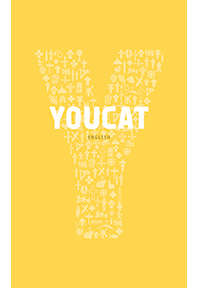 Cover of the Youcat | |
| Author | Christoph Schönborn and others |
|---|---|
| Original title | Katholischer Jugendkatechismus |
| Translator | Michael J. Miller |
| Illustrator | Alexander von Lengerke |
| Cover artist | Alexander von Lengerke |
| Language | German (Original) |
| Subject | Catechism of the Catholic Church |
| Published | 2011
|
| Publication place | Germany |
| Pages | 303 |
| ISBN | 978-1-86082-728-0 |
| Website | https://www.youcat.org/ |
Youcat, short for Youth Catechism of the Catholic Church, also styled as YOUCAT, is a 2011 publication that aims to be an aid for youth to better understand the Catechism of the Catholic Church . The book, presented in the form of questions and answers, is intended for use by Catholic youths around the world and is available in 25 languages, including Arabic and Chinese. Youcat is based on the Catechism of the Catholic Church and the Compendium of the Catechism of the Catholic Church (2005). The catechism has 304 pages and consists of four chapters with 527 questions and answers.
Contents
The guide, whose foreword was written by Pope Benedict XVI, was authored by Cardinal Christoph Schönborn and others. Approximately 700,000 copies of Youcat were distributed in thirteen different languages on behalf of the Pope during World Youth Day 2011 in Madrid. [1]
YouCat books are published and distributed by the YouCat foundation, a subsidiary of Aid to the Church in Need foundation. [2]